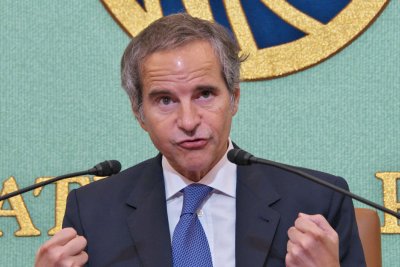
June 12 (UPI) — The U.N. nuclear energy watchdog ruled Thursday that Iran was in breach of its Nuclear Non-Proliferation Treaty obligations by failing to come clean about undeclared nuclear material and activities at multiple sites.
A meeting of the 35-member-nation board of the International Atomic Energy Agency in Vienna voted 19-3 in a favor of the resolution, the first against Iran in 20 years, amid heightened tension over its nculear program and fears an pre-emptive military strike by Israel could be imminent.
Russia, China and Burkina Faso voted against the U.S., British, French and German-sponsored resolution, 11 countries abstained and two did not take part at all.
The vote came after IAEA Director-General Rafael Grossi, in a briefing on the body’s quarterly report, told the board that Iran had not been cooperating and had sufficient 60% enriched uranium to build nine nuclear warheads.
He said the IAEA had been seeking answers from Tehran ever since inspectors found man-made uranium particles at three undeclared locations in 2019 and 2020, including via a series of high-level meetings and consultations that he said he had been personally involved in.
“We have been seeking explanations and clarifications from Iran for the presence of these uranium particles. Unfortunately, Iran has repeatedly either not answered or not provided technically credible answers to the agency’s questions. It has also sought to sanitize the locations, which has impeded agency verification activities,” Grossi said.
The decision prompted a strong reaction from Tehran, which issued a statement criticizing what it called a “political” move that placed the IAEA’s credibility and stature in doubt and that it would bring forward “a new [uranium] enrichment center in a secure location” and update first generation centrifuges at another site.
Prior to the vote it threatened to quit the 1970 NPT, which Tehran has signed but failed to ratify the part that authorizes international inspection teams access to remote regions of Iran where they have reason to believe illicit nuclear development projects may be underway.
On Wednesday, Foreign Minister Abbas Araghchi warned the so-called E3 [Britain, France and Germany] against punishing Iran for its own failures with regard to the 2015 Joint Comprehensive Plan of Action under which the United States, E3, Russia and China agreed to lift some sanctions in return for Iran reining in its nuclear program.
“The E3 have had seven years to implement their JCPOA commitments. They have utterly failed, either by design or ineptitude. Instead of displaying remorse or a desire to facilitate diplomacy, the E3 is today promoting confrontation through the absurd demand that Iran must be punished for exercising its right under the JCPOA to respond to non-performance by its counterparts,” he wrote on X.
“As I have warned: Another major strategic mistake by the E3 will compel Iran to react strongly. Blame will lie solely and fully with malign actors who shatter their own relevance.”
A joint statement issued by the Foreign Office in London said Britain, France, Germany, and United States welcomed the action by the IAEA.
“The board’s collective action upholds the integrity of the IAEA safeguards system and the broader nuclear nonproliferation regime: states will be held to account if they do not live up to their obligations.
“The action creates an opportunity Iran should seize. Iran still has a chance to finally fulfill its obligations, in full candor, and answer the IAEA’s crucial, longstanding questions on undeclared nuclear material and activities,” said the statement.
However, ongoing U.S.-Iran negotiations mediated by Oman that began in April were apparently unaffected with a sixth round between Araghchi and Steve Witkoff, U.S. President Donald Trump‘s special envoy, scheduled to go ahead Sunday as planned, according to Omani Foreign Minister Bad Albusaidi.
The negotiations, exactly five years after Trump pulled the United States out of the JCPOA during his first term, are aimed at replacement deal ensuring Iran does not and cannot develop a nuclear weapon in exchange for removing sanctions.
Iran has always denied working toward developing nuclear weapons, insisting its nuclear program is strictly for energy and other peaceful purposes.